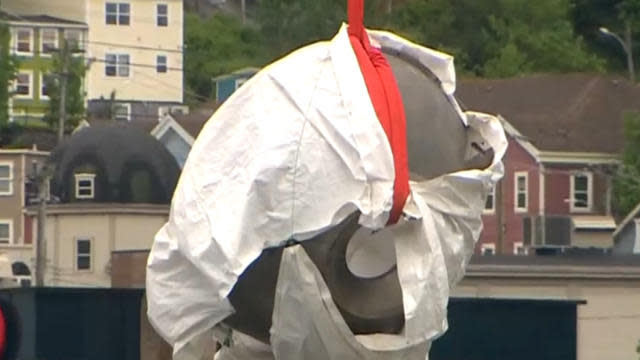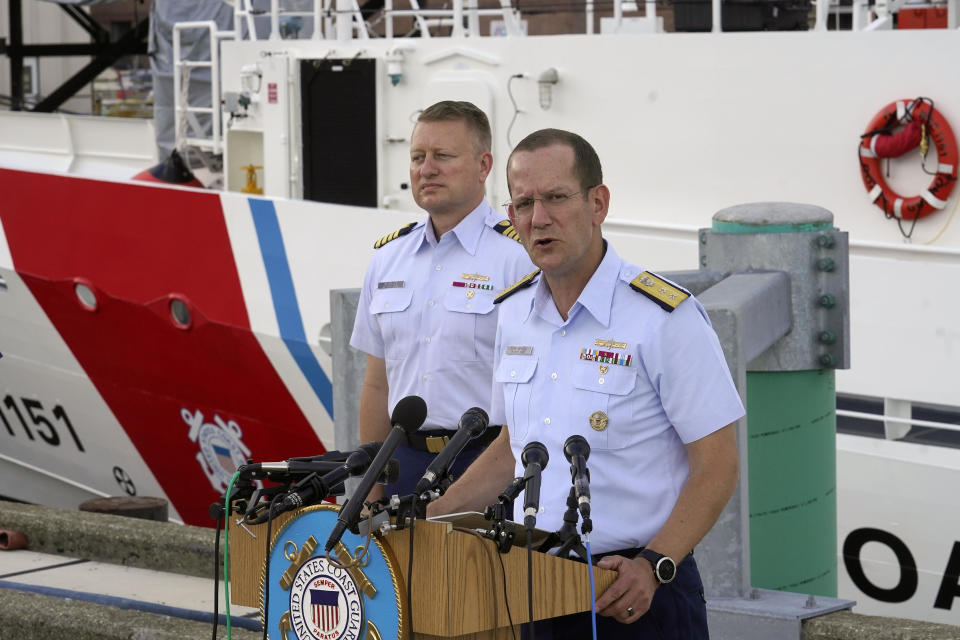Titan investigators will try to find out why sub imploded. Here's what they'll do.
As pieces of debris from the Titan submersible began to be recovered from the ocean's depths on Wednesday, investigators are hoping they might provide answers about what happened in the fateful moments after the sub lost contact with its support vessel about an hour and 45 minutes into its June 18 dive to the wreckage of the Titanic.
On Sunday, the Coast Guard officially convened a Marine Board of Investigation to look into what led to the "catastrophic implosion" that killed the five passengers on the sub.
Since the implosion, reports of the dangers of adventure tourism and safety issues at OceanGate, the company running the expedition, have surfaced. Each passenger paid $250,000 for a sub seat to view the world's most famous shipwreck —an expedition that OceanGate is still advertising on its website. It currently has dates open for June 2024.

A Marine Board of Investigation is the highest level of investigation the Coast Guard conducts, Capt. Jason Neubauer, the chief investigator, said in a news conference. Neubauer said the designation allows the Coast Guard to utilize the highest level of resources and capitalize on its "extensive network of cooperative relationships with international maritime organizations."
The debris arrived in St. John's, Newfoundland, Wednesday, the U.S. Coast Guard said in a statement. The agency also said "presumed human remains" recovered from the sub's wreckage would undergo analysis by American medical professionals.
Evidence recovered from the sea floor for the U.S.-led investigation into the implosion would be transported to a U.S. port for analysis and testing, the Coast Guard said.
"There is still a substantial amount of work to be done to understand the factors that led to the catastrophic loss of the Titan and help ensure a similar tragedy does not occur again," Neubauer said in a statement.
There was no timeline given for when the Marine Board will conclude its work –but here's what investigators might do to find out what happened to the Titan.
How does a marine investigation work?
The Marine Board of Investigation Board will primarily work to determine the cause of the marine accident, said Neubauer. These investigations are conducted to prevent future marine incidents, and since most marine incidents take place in international waters, the cooperation of the interested states, ports and ships is essential, according to a manual from the Marine Accident Investigators International Forum. The investigation will include authorities from Canada, France and the United Kingdom.

The investigation will be carried out in four different phases, according to the manual guide. First, there will be evidence gathering, a phase that has already begun in Newfoundland, Canada; followed by witness interviews; an accident reconstruction and analysis, and finally a report with recommendations.
CBS Boston reported the Coast Guard has already scheduled interviews with crew members of the Polar Prince, the Canadian ship that launched the Titan submersible.
Could actions that led to the Titan implosion be a crime?
The MBI will look into any accountability aspects and can make recommendations for civil or criminal sanctions if necessary. The investigation can determine "whether an act of misconduct, incompetence, negligence, unskillfulness, or willful violation of law" contributed to the accident.
Any subsequent enforcement will be pursued under a separate investigation, Neubauer said.
The Marine Board of Investigation will produce a report with its findings, which will be sent to the Coast Guard Commandant and international maritime partners in an effort to improve safety measures for submersibles worldwide, according to Neubauer.

There were concerns that OceanGate founder Stockton Rush, who was in the sub, was "putting paid passengers in danger" by using carbon fiber to build the submersible, deep sea expert Rob McCallum, who consulted for the company, told CBS News.
He shared emails with the BBC that he wrote to Rush stating his worries about the submersible. McCallum told CBS News he was concerned by the culture at OceanGate. He said that any time someone raised a safety concern, Rush would take it as a "personal affront."
"No one should ever take safety as a personal threat," McCallum said.
How will investigators collect evidence from the Titan debris?
The investigation is in its initial evidence-collection phase, said Neubauer. The Coast Guard is coordinating with Canadian authorities in Newfoundland to gather the evidence. The M/V Horizon Artic arrived on Wednesday in Newfoundland to retrieve evidence from the debris floor, the Coast Guard said in a statement. The ship arrived at 7:36 a.m. at St. John's Port, according to Marine Traffic, a maritime tracking website.
Built in 2016, the Horizon Artic is specially designed for complex offshore operations and has a remotely operated vehicle (ROV) hangar with launch and recovery systems, according to Horizon Maritime.
L. David Marquet, a retired Navy captain, told CBS News that pieces "could be X-rayed" to check for "tiny cracks that might have developed in the metal." It might be difficult to distinguish which cracks appeared when the sub imploded under "water pressure the weight of the Empire State Building" and what was there prior to the accident, Marquet said.
The Marine Accident Investigators International Forum recommends speaking to witnesses, gathering physical evidence and documenting as much as possible from the site.
After the evidence collection concludes, Marine Board Investigators will hold a public hearing before compiling a final report.
Reporting was contributed by Roxana Saberi, Alex Sundby and Aliza Chasan.
Supreme Court strikes down Biden student loan forgiveness plan
Amid protests in France, Macron calls cabinets crisis meeting
How will the Supreme Court's affirmative action ruling affect medical schools?

